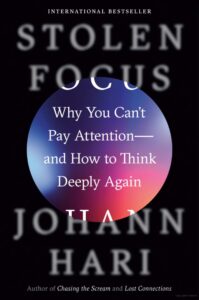As a senior technology professional who lived through the earlier half of his life without the internet, I found Johann Hari’s book, “Stolen Focus: Why You Can’t Pay Attention,” to be a real eye-opener. With all the distractions of modern life, it’s no wonder we struggle to focus on anything for more than a few minutes. And let’s face it, as someone who once owned a Super Nintendo and played games on a black and white TV, I know a thing or two about distractions.

Hari’s book delves into the various factors that contribute to our inability to concentrate, from the constant barrage of notifications on our phones to the sheer amount of information available at our fingertips. He also explores the impact of social media on our attention spans, and how the need for instant gratification has made it difficult for us to stick with anything for an extended period of time.
As someone who used to read books cover to cover in a few sittings, I can attest to the fact that this is a real problem. At times, I also find myself checking my phone every few minutes and losing track of what I was doing. It’s frustrating, to say the least. But thanks to Hari’s insights, I now have a better understanding of why this happens and what I can do to combat it.
One of the things I appreciated about this book is that Hari doesn’t just offer vague solutions like “put down your phone” or “turn off your notifications.” Instead, he provides concrete steps that readers can take to regain their focus and improve their attention span. For example, he recommends setting specific times to check your email or social media accounts, rather than constantly refreshing them throughout the day. He also suggests using the Pomodoro Technique, which involves working for 25 minutes and then taking a short break, as a way to stay focused on a particular task.
But perhaps my favorite part of the book was the chapter on “mindful procrastination.” I found Hari’s explanation of why we procrastinate to be both insightful and amusing. He points out that we often procrastinate because we’re afraid of failure, or because we’re not sure where to start. But instead of beating ourselves up for procrastinating, he suggests embracing it and using the time to engage in a different activity that is still productive. For example, if you’re avoiding writing a report, you could spend some time organizing your desk or responding to emails. This allows your brain to take a break from the task at hand while still making progress on something else.
Overall, I found “Stolen Focus” to be an engaging and informative read. As someone who has witnessed the evolution of technology over the years, I can attest to the fact that our attention spans have suffered as a result. But thanks to Hari’s insights, I now have a better understanding of why this is the case and what I can do to improve my focus. So if you’re someone who finds themselves constantly distracted, I highly recommend giving this book a read. Just make sure you turn off your phone first. 😊